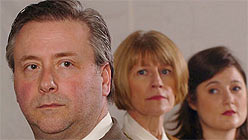The British mathematician and cryptanalyst Alan Turing may have been one of the smartest people who has ever lived. During World War II, he helped crack the Enigma codes that enabled Nazi U-boats to sink merchant ships at will, thus breaking Germany’s naval blockade of the United Kingdom. A grateful nation awarded him an Order of the British Empire for his efforts. After the war, he laid the groundwork for the first computer, wrote an influential paper about artificial intelligence and studied the link between Fibonacci number sequences and morphogenesis.
In short, Turing was a pretty bright guy, whose life was devoted to the exposure of unsolvable secrets and the formulation of new, unanticipated truths. So perhaps it isn’t completely surprising that Turing essentially invited the police to discover his homosexuality, which he then went on to confess without even being asked. Turing had to have known that homosexuality was a crime in England when he revealed it in 1952, but he appears to have lacked the common sense to predict that his confession would ruin his career. By the summer of 1954, just a few weeks shy of his 42nd birthday, Turing was dead, a half-eaten, cyanide-laced apple by his side.
Breaking the Code, now through May 2, 2009 at Bus Barn Stage Company in Los Altos, does a good job of telling the based-on-a-true-story account of this brilliant man. The reason for the play’s success is largely due to Geoff Fiorito’s confident portrayal of Turing. Fiorito touchingly captures Turing’s nervous fingernail biting, his stutter and his discomfort in his own skin. Which is not to say the performance is one-dimensional. He also delivers Turing’s eloquent sides, from the weary, unapologetic candor he displays about his sexual orientation to his skills as a lecturer. In fact, Fiorito is so good at communicating Turing’s Wittgenstein-inspired logic that there are moments during the play when we feel as if we too might understand the secrets of the universe.
Hugh Whitemore’s 1986 play, which originally starred Derek Jacobi, opens in 1952 with Turing reporting a burglary to a skeptical detective named Mick Ross (Michael Champlin). At this point in Turing’s life, Turing’s most productive years are behind him, but he doesn’t know that yet. Perhaps he believes that if he could beat the Nazi’s Enigma machine he can manage a local cop, but Turing is an unskilled liar. Ross can spot a flimsy story a mile away, and plays the great man like a fool.
Cut to 1929. Turing has brought a friend, Christopher Morcom (Blaze Mancillas) home from Sherbourne, where they are attending school together. “Alan has talked so much about you,” gushes Turing’s mother, Sara (Sondra Putnam), without realizing the implications of her innocent statement. This is where it all began, we think. His mother’s blind eye to his devotion to young men has left Turing woefully unprepared for encounters with the Mick Rosses of the world.


